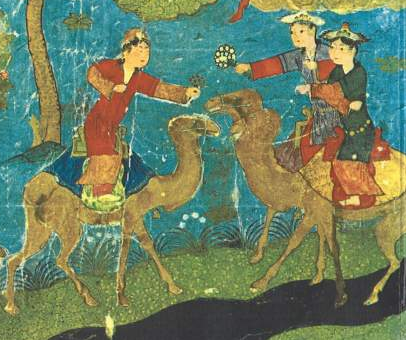HOURI Let Grace of the Lord be your Mecca and becoming the dust of the feet be your fast. Let the practice of Pir\’s (Guru\’s) instruction as required be your Bhista (Paradise). The devotion of the Lord-God in suitable cloister by your Hourt, light and fragrance. (Maru M. 5, p. 1083) In Muslim belief any of the nymphs of Paradise is a Houri. When the faithful enters the heaven, he is welcomed by a houri. Guru Arjan Dev, in the above reference has rejected the idea of the enjoyment of a houri by a faithful Muslim.
References :
1. Kohli, Surindar Singh (ed), Dictionary of Mythological References in Guru Granth Sahib, 1993
In Islamic mythology and tradition, Houris are described as celestial beings who inhabit paradise (Jannah). They are mentioned in the Quran and Islamic literature as rewards for the faithful, embodying beauty, purity, and grace. The concept of Houris is often interpreted metaphorically, symbolizing the blessings and rewards that await the righteous in the afterlife.
Description of Houris
- Attributes: Houris are depicted as beings of extraordinary beauty, purity, and perfection. They are said to have radiant and luminous appearances, symbolizing eternal youth and tranquility.
- Symbolism: In Islamic thought, Houris represent not only physical beauty but also spiritual and emotional purity. They are often seen as allegories for the spiritual rewards and eternal joy promised in paradise.
- Mentions in the Quran: Houris are described in several verses of the Quran as companions of the righteous in paradise. For example, they are referred to as beings “pure and refined” (Surah Al-Waqia, 56:22-24) and “of modest gaze, with eyes like pearls” (Surah As-Saffat, 37:48-49). The descriptions highlight their ethereal and divine nature. Interpretations
The concept of Houris has been understood in various ways within Islamic scholarship:
- Literal Interpretation: Some view Houris as actual beings that will exist in the afterlife, emphasizing the physical and spiritual rewards for the devout.
- Metaphorical Interpretation: Others see Houris as symbolic representations of divine rewards, inner peace, or spiritual enlightenment. Cultural and Spiritual Significance
Houris are integral to the Quranic portrayal of paradise, reinforcing themes of purity, eternal bliss, and the fulfillment of divine promises. They serve as reminders of the spiritual path and the rewards of living a righteous and moral life.







